新概念二册L2重点
(完整版)新概念第二册每一课重点的总结
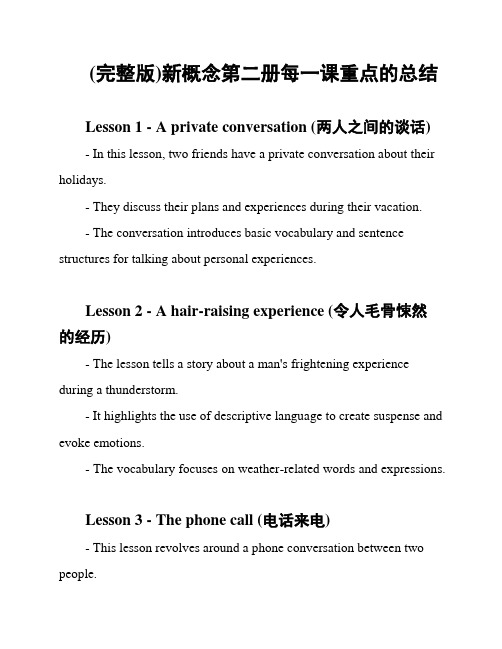
(完整版)新概念第二册每一课重点的总结Lesson 1 - A private conversation (两人之间的谈话)- In this lesson, two friends have a private conversation about their holidays.- They discuss their plans and experiences during their vacation.- The conversation introduces basic vocabulary and sentence structures for talking about personal experiences.Lesson 2 - A hair-raising experience (令人毛骨悚然的经历)- The lesson tells a story about a man's frightening experience during a thunderstorm.- It highlights the use of descriptive language to create suspense and evoke emotions.- The vocabulary focuses on weather-related words and expressions.Lesson 3 - The phone call (电话来电)- This lesson revolves around a phone conversation between two people.- The dialogue also includes expressions for making suggestions and giving advice.Lesson 4 - A famous monastery (一座著名的修道院) - The lesson describes a visit to a famous monastery.- It introduces vocabulary related to religious buildings and their surroundings.- Additionally, it provides practice in forming questions and giving short answers.Lesson 5 - A trip to Australia (澳大利亚之行)- In this lesson, a young girl talks about her trip to Australia.- Vocabulary related to travel, geography, and animals is presented.Lesson 6 - A rainy Saturday (一个雨天的星期六)- The lesson portrays a girl's activities on a rainy Saturday.- It introduces vocabulary relevant to hobbies and leisure activities.- The use of present continuous tense is emphasized to describe ongoing actions.Lesson 7 - Money, money, money! (金钱,金钱,金钱!)- This lesson explores the influence of money on people's lives.- It introduces vocabulary related to finance, business, and personal finances.- The dialogue highlights the use of modal verbs for making suggestions and giving advice.Lesson 8 - Mr. Hiker (远足先生)- The lesson narrates Mr. Hiker's experience hiking in the mountains.- Vocabulary related to nature, camping, and hiking is presented.- The past simple tense is practiced to describe past events.Lesson 9 - No parking (禁止停车)- This lesson focuses on the concept of parking restrictions.- Vocabulary related to road signs, transportation, and rules is introduced.Lesson 10 - Cycling for charity (骑自行车为慈善事业)- The lesson discusses a charity event involving cycling.- Vocabulary related to sports, charity, and participation in events is presented.- The dialogue emphasizes the use of phrasal verbs and expressions related to physical activities.Lesson 11 - Adventure sports (冒险运动)- In this lesson, different adventure sports are introduced and discussed.- Vocabulary related to extreme sports, risk-taking, and outdoor activities is presented.- The lesson also focuses on the use of present perfect tense to describe past experiences.Lesson 12 - Life in a big city (大城市的生活)- The lesson describes the advantages and disadvantages of living in a big city.- It introduces vocabulary related to urban life, city services, and facilities.- The dialogue includes phrases for expressing opinions and preferences.[...continued...]。
新概念二册各课重点
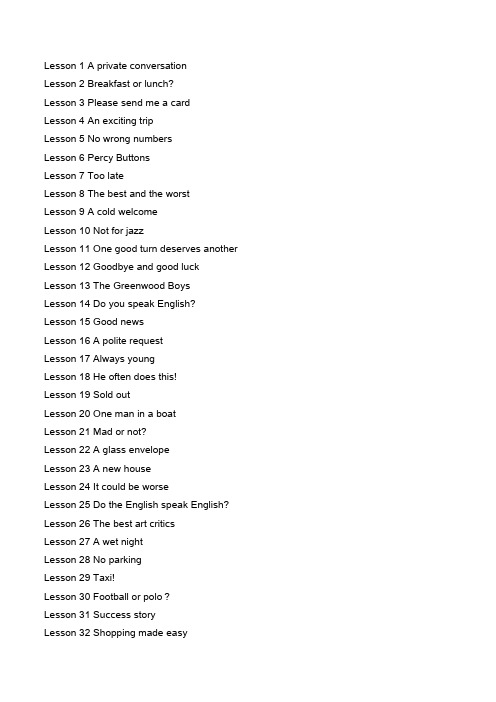
Lesson 1 A private conversationLesson 2 Breakfast or lunch?Lesson 3 Please send me a cardLesson 4 An exciting tripLesson 5 No wrong numbersLesson 6 Percy ButtonsLesson 7 Too lateLesson 8 The best and the worstLesson 9 A cold welcomeLesson 10 Not for jazzLesson 11 One good turn deserves another Lesson 12 Goodbye and good luck Lesson 13 The Greenwood BoysLesson 14 Do you speak English?Lesson 15 Good newsLesson 16 A polite requestLesson 17 Always youngLesson 18 He often does this!Lesson 19 Sold outLesson 20 One man in a boatLesson 21 Mad or not?Lesson 22 A glass envelopeLesson 23 A new houseLesson 24 It could be worseLesson 25 Do the English speak English? Lesson 26 The best art criticsLesson 27 A wet nightLesson 28 No parkingLesson 29 Taxi!Lesson 30 Football or polo?Lesson 31 Success storyLesson 32 Shopping made easyLesson 33 Out of the darknessLesson 34 Quick workLesson 35 Stop thief!Lesson 36 Across the ChannelLesson 37 The Olympic GamesLesson 38 Everything except the weather Lesson 39 Am I all right?Lesson 40 Food and talkLesson 41 Do you call that a hat?Lesson 42 Not very musicalLesson 43 Over the South PoleLesson 44 Through the forestLesson 45 A clear conscienceLesson 46 Expensive and uncomfortable Lesson 47 A thirsty ghostLesson 48 Did you want to tell me something? Lesson 49 The end of a dreamLesson 50 Taken for a rideLesson 51 Reward for virtueLesson 52 A pretty carpetLesson 53 Hot snakeLesson 54 Sticky fingersLesson 55 Not a gold mineLesson 56 Faster than sound!Lesson 57 Can I help you, madam?Lesson 58 A blessing in disguise?Lesson 59 In or out?Lesson 60 The futureLesson 61 Trouble with the HubbleLesson 62 After the fireLesson 63 She was not amusedLesson 64 The Channel TunnelLesson 65 Jumbo versus the policeLesson 66 Sweet as honey! Lesson 67 VolcanoesLesson 68 PersistentLesson 69 But not murder! Lesson 70 Red for danger Lesson 71 A famous clock Lesson 72 A car called bluebird Lesson 73 The record-holder Lesson 74 Out of the limelight Lesson 75 SOSLesson 76 April Fools' Day Lesson 77 A successful operation Lesson 78 The last one? Lesson 79 By airLesson 80 The Crystal Palace Lesson 81 EscapeLesson 82 Monster or fish? Lesson 83 After the elections Lesson 84 On strikeLesson 85 Never too old to learn Lesson 86 Out of control Lesson 87 A perfect alibi Lesson 88 Trapped in a mine Lesson 89 A slip of the tongue Lesson 90 What's for supper? Lesson 91Three men in a basket Lesson 92 Asking for trouble Lesson 93 A noble giftLesson 94 Future champions Lesson 95 A fantasyLesson 96 The dead return简单陈述句的语序一般现在时,现在完成时;感叹句一般过去时现在完成时一般过去时与现在完成时冠词过去进行时比较级和最高级时间介词的用法各种时态的被动语态复习Lesson2-Lesson10一般将来时将来进行时过去完成时陈述句的直接引语变间接引语if引导的真实条件句情态动词musthave的用法can & may动名词双宾语结构的被动语态介词of & from & in & on的用法There is 和 it is的用法复习Lesson1-Lesson24课难点并列句中的语序宾语从句一般过去时定语从句(关系代词)现在完成时表动作的延续性定冠词the的用法; some 与any的区别used to的用法比较状语从句用于表示目的和方向的介词不定式的被动语态so & such句型will与be going to 的用法及区分将来完成时no sooner…than… 和 hardly… when… 句型疑问句直接引语变间接引语if 引导的虚拟条件句(对现在情况的虚拟)must,have to 和need的用法have加名词与相应动词的替换can & be able to动名词被动语态的复习同位语从句;与to,at, for和with连用的动词复习Lesson36-Lesson45课关键句型定语从句(关系副词);复习Lesson25-Lesson48课难点复合句的语序现在分词作伴随状语一般过去时现在完成时与现在完成进行时的区分一般过去时,现在完成时和现在完成进行时的区分定冠词、不定冠词的用法总结used to和would的用法表示比较关系的句型介词in,with, at, off的用法被动语态;强调句表示目的的结构与句型一般将来时的总复习将来完成时,将来进行时和将来完成进行时的区分过去完成时和过去完成进行时的区分祈使句的直接引语变间接引语if引导的非真实条件句(与过去事实相反)表示“应该”和“必须”的情态动词使役动词have的用法can.be able to和manage to 的用法区分动词和动名词被动语态形容词后的介词复习Lesson60-Lesson69课关键句型复习Lesson50-Lesson71课难点简单句,并列句和复合句非限定性定语从句;现在进行时和一般现在时一般过去时现在完成时 & 现在完成进行时一般过去时,现在完成时和现在完成进行时的区分冠词的用法复习双重否定句;倒装句比较状语从句介词at, in, to, with的用法被动语态总复习状语从句的省略一般将来时一般将来时,将来进行时和将来完成进行时过去完成时总复习直接引语变间接引语总复习if条件句总复习情态动词总复习;同位语从句have的用法总结can.be able to和manage to 的用法复习否定转移;So do I句型被动语态总复习;同形不同音的词介词与形容词的搭配过去完成时在虚拟语气中的运用复习Lesson74-Lesson91课的难点。
新概念英语二册重点单词课文
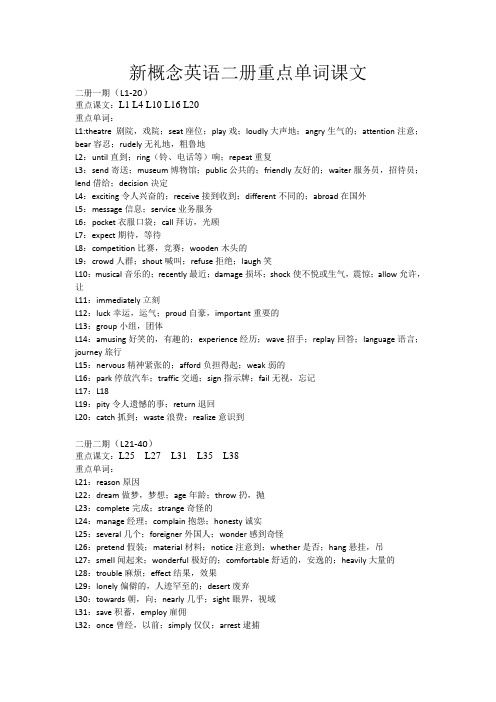
新概念英语二册重点单词课文二册一期(L1-20)重点课文:L1 L4 L10 L16 L20重点单词:L1:theatre 剧院,戏院;seat座位;play戏;loudly大声地;angry生气的;attention注意;bear容忍;rudely无礼地,粗鲁地L2:until直到;ring(铃、电话等)响;repeat重复L3:send寄送;museum博物馆;public公共的;friendly友好的;waiter服务员,招待员;lend借给;decision决定L4:exciting令人兴奋的;receive接到收到;different不同的;abroad在国外L5:message信息;service业务服务L6:pocket衣服口袋;call拜访,光顾L7:expect期待,等待L8:competition比赛,竞赛;wooden木头的L9:crowd人群;shout喊叫;refuse拒绝;laugh笑L10:musical音乐的;recently最近;damage损坏;shock使不悦或生气,震惊;allow允许,让L11:immediately立刻L12:luck幸运,运气;proud自豪,important重要的L13:group小组,团体L14:amusing好笑的,有趣的;experience经历;wave招手;replay回答;language语言;journey旅行L15:nervous精神紧张的;afford负担得起;weak弱的L16:park停放汽车;traffic交通;sign指示牌;fail无视,忘记L17:L18L19:pity令人遗憾的事;return退回L20:catch抓到;waste浪费;realize意识到二册二期(L21-40)重点课文:L25 L27 L31 L35 L38重点单词:L21:reason原因L22:dream做梦,梦想;age年龄;throw扔,抛L23:complete完成;strange奇怪的L24:manage经理;complain抱怨;honesty诚实L25:several几个;foreigner外国人;wonder感到奇怪L26:pretend假装;material材料;notice注意到;whether是否;hang悬挂,吊L27:smell闻起来;wonderful极好的;comfortable舒适的,安逸的;heavily大量的L28:trouble麻烦;effect结果,效果L29:lonely偏僻的,人迹罕至的;desert废弃L30:towards朝,向;nearly几乎;sight眼界,视域L31:save积蓄,employ雇佣L32:once曾经,以前;simply仅仅;arrest逮捕L33:darkness黑暗;explain解释,叙述;storm暴风雨;struggle挣扎L34L35:regret后悔;far非常;fright害怕L36: record记录;succeed成功;train训练;intend打算L37: hold召开;capital首都;design设计L38: except出了L39: successful成功的;patient病人;alone独自的L40: hostess女主人;fix凝视二册三期(L41-60)重点课文:L44 L46 L51 L54 L57重点单词:L41:rude无礼的;remind提醒L42:continue继续;difference差别L43:lie处于;serious严重的;seem似乎,好像L44:forest森林;picnic野餐;breath呼吸L45:wallet皮夹;钱夹;villager村民L46:woolen羊毛的;discover发现;admit承认L47:thirsty贪杯的;furniture家具;suggest暗示;accept接受L48:collect搜集L49:tired厌烦的;real真正的;owner主人;sweep扫,刮L50:L51:diet节食;forbid禁止;strict严格的L52:space空间;actually实际上L53:cause引起,原因;examine检查;solve解决L54:mix混合,拌和;annoying恼人的;recognize认出,听出;persuade说服,劝说L55:invent发明;finally最后;confident有信心的;value价值L56:sound声音;speed疾驶L57:punish惩罚L58:increase增加;plant种植L59:expert专家;habit习惯L60:future未来二册四期(L61-80)重点课文:L62 L64 L70 L75 L78重点单词:L61:billion10亿;astronaut宇航员;distant遥远的L62:control控制;surrounding周围的;century世纪L63:admire赞美,钦佩;close亲密的L64:double双的;fear害怕;European欧洲的L65:Christmas圣诞节;present礼物;weigh重;fortunate幸运的L66:survey调查;rescue营救;imagine想象L67:active活动的;manage设法;escape逃脱;alive活着的L68:avoid避开;insist坚持做L69:instruct命令,指示;suppose假设L70:remark评语,言论;safety安全地带L71:official官员,行政人员;check检查L72:racing竞赛;average平均的L73: shame惭愧,羞耻L74: fan狂热者,迷L75: thick厚的;signal信号;helicopter直升飞机;scene现场;survivor幸存者L76: fool傻瓜;leading主要的;present目前的;champion冠军;studio播音室L77: temple庙;disease疾病;last持续;prove显示出L78: concentration集中,专心;suffer受苦,受害;temper脾气;urge力劝,怂恿;satisfaction 满意,满足;delighted欣喜的L79: frightened害怕,担惊;curious急于了解的,好奇的L80:palace宫殿;exhibition展览;various各种各样的;display展览;college学院二册五期(L81-96)重点课文:L81 L85 L89 L93重点单词:L81:rapidly迅速地;uniform制服;shoulder肩L82:sailor海员;creature动物,生物L83:defeat打败;opponent反对者,对手;progressive进步的L84:agreement协议;pressure压力,麻烦;volunteer自动提出,自愿;gratitude感激;object 不赞成,反对L85:inform告诉,通知;contribute捐助,援助;patience耐心;encouragement鼓励;honour 敬意;total总数;devote致力于L86:dismay沮丧;gently缓慢地,轻轻地L87:employer雇主;confirm确认,证实;truth真相L88:surface地面,表面L89:comedy喜剧;queue排队;dull枯燥的,无味的;advertiser报幕员L90:terrifying吓,使恐怖;variety品种;factor因素L91:balloon气球;spy侦察L92:tone语调,腔调L93:statue雕像;support支持,支撑;transport运送L94:L95:heaven天堂L96:festival 节日。
新概念二 L12

§ Lesson— 12 Goodbye and good luck 再见, 一路顺风Our neighbour, Captain Charles Alison, will sail from Portsmouth tomorrow. We will meet him at the harbour early in the morning. He will be in his small boat, Topsail.Topsail is a famous little boat. It has sailed across the Atlantic many times. Captain Alison will set out at eight o'clock so we shall have plenty of time. We shall see his boat and then we shall say goodbye to him. He will be away for two months. We are very proud of him. He will take part in an important race across the Atlantic.一、生词和短语1、luck n. 运气, 幸运good lucklucky dog 幸运儿bless you 保重lucky day 幸运日: It’s my lucky day.今天我真幸运unluckyluckily adv.2、captain n. 船长American captain___________ captain Jack___________3、sail v. 航行Sailing is my hobby. Going sailing is my hobby.4、harbourn. 港口port___________ airport___________5、proud adj. 自豪be proud of : 以...为自豪Parents are proud of their children.pride n. take pride in 以... 为自豪6、important adj. 重要的Be important to 对…重要的Learning English well _________________ ________ . 学习好英语对我们很重要。
新概念英语第二册-L2

ring
1 n. small circular band of precious metal a diamond ring sound of a bell There was a ring at the door. telephone call I will give you a ring tomorrow. 2 v. make a clear resonant sound ,usually like that of a bell being struck Will you answer the phone if it rings?
•
Breakfast
Have fun!
Soy-bean milk deep-fried dough sticks hot-dry noodles
steamed stuffed bun
Lunch
Have fun!
fried shredded pork with Sweet and sour sauce
• 3. I never get up early on Sunday. I sometimes stay in bed until lunchtime. • 这两句话都用到了一般现在时,表示作者的一 种习惯。 • 一般现在时的功能如下: • 1)表习惯性动作或职业,常与频度副词连用: never, always, often, usually, sometimes, seldom, frequently, occasionally, rarely, every day 等。 • e.g. I always take a walk after supper. • He rarely goes to the cinema.
• • • • •
(完整版)新概念第二册各课的语法点归纳
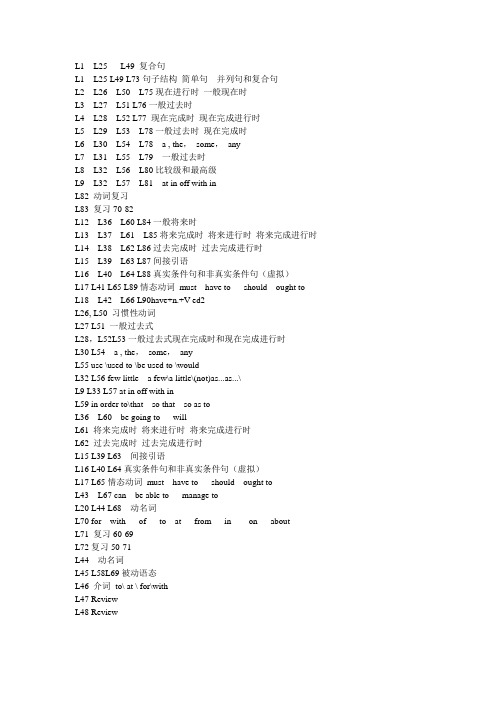
L1 L25 L49 复合句L1 L25 L49 L73句子结构简单句并列句和复合句L2 L26 L50 L75现在进行时一般现在时L3 L27 L51 L76一般过去时L4 L28 L52 L77 现在完成时现在完成进行时L5 L29 L53 L78一般过去时现在完成时L6 L30 L54 L78 a , the,some,anyL7 L31 L55 L79 一般过去时L8 L32 L56 L80比较级和最高级L9 L32 L57 L81 at in off with inL82 动词复习L83 复习70-82L12 L36 L60 L84一般将来时L13 L37 L61 L85将来完成时将来进行时将来完成进行时L14 L38 L62 L86过去完成时过去完成进行时L15 L39 L63 L87间接引语L16 L40 L64 L88真实条件句和非真实条件句(虚拟)L17 L41 L65 L89情态动词must have to should ought toL18 L42 L66 L90have+n.+V-ed2L26, L50 习惯性动词L27 L51 一般过去式L28,L52L53一般过去式现在完成时和现在完成进行时L30 L54 a , the,some,anyL55 use \used to \be used to \wouldL32 L56 few little a few\a little\(not)as...as...\L9 L33 L57 at in off with inL59 in order to\that so that so as toL36 L60 be going to willL61 将来完成时将来进行时将来完成进行时L62 过去完成时过去完成进行时L15 L39 L63 间接引语L16 L40 L64真实条件句和非真实条件句(虚拟)L17 L65情态动词must have to should ought toL43 L67 can be able to manage toL20 L44 L68 动名词L70 for with of to at from in on aboutL71 复习60-69L72复习50-71L44 动名词L45 L58L69被动语态L46 介词to\ at \ for\withL47 ReviewL48 Review。
新概念英语2册-L2

It’s a beautiful flower.
What a beautiful flower it is!
They are lovely birds.
What lovely birds they are!
clean
• What clean water it is!
lWhat a beautiful flower it is! What lovely birds they are!
What do Westerners eat for breakfast?
• • • • 香肠 sausage, 培根 bacon, 大豆 soybean, 烤面包,土司 toast , • orange juice, coffee, tea, milk • 早午餐 ,晚吃的 午餐 brunch
New words
never<seldom<sometimes< often<usually<always
1. 2. 3. 4. 5. 6. I never went to the class in high school time. I seldom read books in my spare time. Sometimes she watches TV at home We often meet at the coffee shop. Usually Mr. Johnson is a moral man. Mr.Johnson always guides us to be a good man.
3.just then: 就在那时
4.by train by 直接加交通工具(不能有任何修饰词, I go out by bus/on two buses.
新概念英语第二册L22

think of:想、考虑 dream of:梦想 I dreamed of flying in the sky.
★age n. 年龄 teenager:十几岁的人,青少年 ★channel n. 海峡
★throw v. 扔,抛 throw—threw---thrown throw away 扔掉
dream ______ throw sth _____ think ______ travel _____ put sth _____ receive sth ____sb
跟of, from, in和on的动词
1、后接of的动词: accuse of(控告);approve of(赞成);assure of(让……放心);beware of(谨防);boast of/about(炫耀), complain of/about(埋怨); consist of(由……组成);convince of/about(使 信服);cure of(治愈);despair of(丧失……希 望);dream of/about(幻想);expect of/from( 期望);hear of/from(听到……消息);be/get rid of(摆脱);smell of(闻到);suspect of(对 ……猜疑);think of/about(思考);tired of(对 ……感到厌烦);warn of/against(警告……有危 险)
2、后接from的动词: borrow from(从……借);defend from/against ( 保护……使免于);demand from/of(向……要求) ;differ from(有别于);dismiss from(解雇); draw from(从……中得出);emerge from(从…… 出现);escape from(从……逃出);excuse from/for(答应不……);hinder from(阻止); prevent from(妨碍);prohibit from(不准许); protect from/against(向……提抗议);receive from(接到);separate from(把……分开); suffe from(受难)
新概念英语第二册第二课 L2-20200228
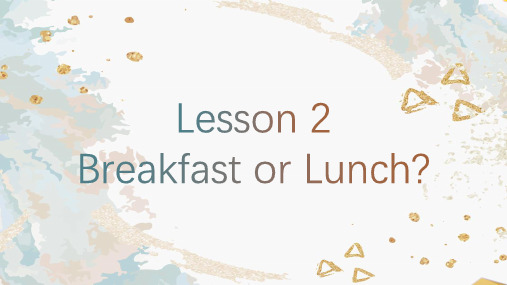
如果是特指的交通工具,则要加 冠词 或其他限定词:
• My aunt left 我阿姨
. 离开的。
I am coming to see you.
come, go, arrive, leave 等动词的现在进行时, 表示为将来安排好的活动和事件。
A relation of yours is coming to see you. He’s arriving this evening . He’s leaving tomorrow afternoon.
★ aunt n. 姑,姨,婶,舅妈
• 所有长一辈的女性都用这个称呼 • 男性则是uncle: 叔叔 • 上述长辈的子女:cousin 堂兄妹,表兄妹(不分男女)
• cousin的孩子:nephew 外甥,侄子 niece 外甥女,侄女
★repeat v. 重复
① vt. 重复 • 你能重复最后一个词吗? • Will you repeat the last word? • 跟著我念这些句子 • Repeat these sentences after me. ② vi. 重做,重说 • 她只是反覆地做同样的事 • She did nothing but repeated.
Just then, the telephone rang. It was my aunt Lucy.
• just then: 就在那时 • 如果不知道对方性别, 他/她可以用it取代 • 这是谁? • Who is it ?
'I've just arrived by train,' she said. 'I'm coming to see you.'
• 句中位置:实义动词前,非实义动词后。 I never get up early on Sundays.
新概念第二册Lesson 2知识要点总结

新概念第二册Lesson 3 第一课时复习资料一.词汇拓展:1.SendSend sb. Sth.=sent sth. to sb.My brother sent me a letter yesterday.My brother sent a letter to me yesterday.2.PostcardBank card银行卡ID card 身份证Credit card信用卡VIP card 会员卡3.Spoil 无形的损坏Break 打破易碎的东西Damage 损坏东西(可以修复)Destroy摧毁Sorry, I spoilt your soup.I put too much salt in it.不好意思,我毁了你的汤。
我放太多盐进去了。
Break a vase/window/glass/leg/promise(承诺)You damaged the door and you have to repair it.你把门弄坏了,你必须得修。
They destroyed the ship.他们摧毁了那艘轮船。
4.MuseumThe Palace Museum故宫The history museum 历史博物馆5.PublicPublic places 公共场所In public 公开地,当众You can’t speak to me like that in public.你不能当众对我那么说话。
6.FriendlyFriend----friendlyLove----lovelyDay----dailyWeek----weeklyMonth----monthlyYear----yearlyIn a friendly way 以一种友好的方式7.waiter----waitressActor----actress8.LendLend sb. Sth.=lend sth.to sb.Borrow sth. From sb.Tom lent me his car.=Tom lent his car to me.=I borrowed the car from Tom.=I borrowed Tom’s car.9.DecisionMake a big decision to do sth.Decide to do sth.He decided to go to Paris for his holiday.他决定去巴黎度假。
新概念第二册L12知识要点总结
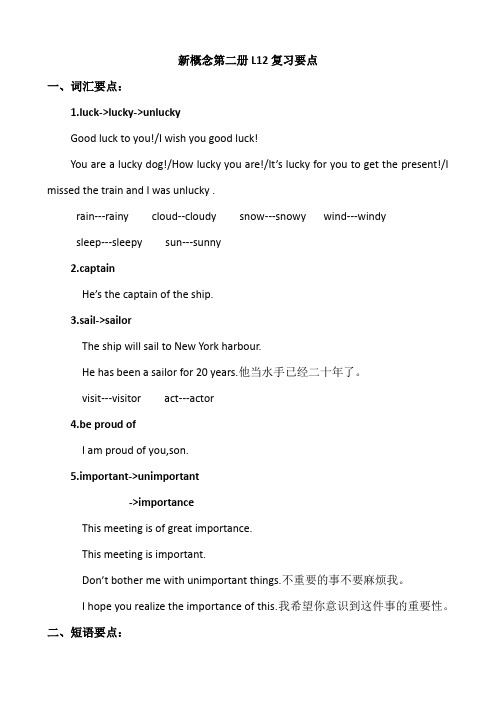
新概念第二册L12复习要点一、词汇要点:1.luck->lucky->unluckyGood luck to you!/I wish you good luck!You are a lucky dog!/How lucky you are!/It’s lucky for you to get the present!/I missed the train and I was unlucky .rain---rainy cloud--cloudy snow---snowy wind---windysleep---sleepy sun---sunny2.captainHe’s the captain of the ship.3.sail->sailorThe ship will sail to New York harbour.He has been a sailor for 20 years.他当水手已经二十年了。
visit---visitor act---actor4.be proud ofI am proud of you,son.5.important->unimportant->importanceThis meeting is of great importance.This meeting is important.Don’t bother me with unimportant things.不重要的事不要麻烦我。
I hope you realize the importance of this.我希望你意识到这件事的重要性。
二、短语要点:be+adverbbe back----I’ll be back in 5 minutes.be away----He has been away for 2 months.be over----The movie was over 2 minutes ago.be in/out----I wasn’t in when you visited.I was out for dinner with my friends.be on------Nothing interesting is on at the cinema at present.be up to------I think Francis will be up to the job.set out/off/upWe’ll set out for Hangzhou in two days.They set off early in the morning.She set up a new world record.plenty of time=enough timetake part in 参加early in the morninglate in the morning/early in the afternoon/late in the afternoon三.语法要点:定语从句1. Our neighbour will sail tomorrow.His name is Charles Alison..Our neighbour,whose name is Charles Alison, will sail tomorrow.2.His boat is famous.The name of his boat is Topsail.His boat, the name of which is Topsail,is famous.。
新概念2L2 A Breakfast or lunch
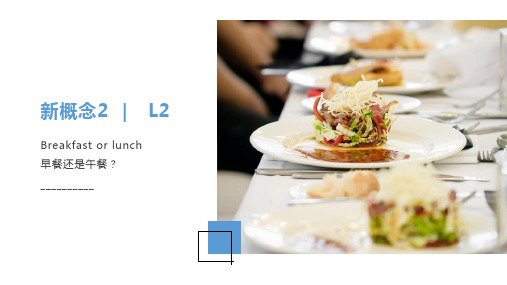
Key structures|句子结构
现在进行时 可用进行时表示即将开始的动作:
go
come
leave land
arrive meet
die
start
join
那是个星期天, 而在星期天我是从来不早起的, 有时我要一直躺到吃午饭的时候。 上个星期天,我起得很晚。 我望望窗外,外面一片昏暗。 “鬼天气!”我想,“又下雨了。” 正在这时,电话铃响了。 是我姑母露西打来的。 “我刚下火车,”她说,“我这就来看
It was Sunday. I never get up early on Sundays. I sometimes stay in bed until lunchtime. Last Sunday I got up very late.
○ was 是is的过去式 ○ got是get的过去式
look------looked is------was think------thought ring-----rang
v.(铃,电话)响 ring-rang -rung 打电话 ring sb. call sb. telephone sb. give sb a phone call. ring off挂电话
aunt [ɑ:nt] n.姑,姨,婶,舅妈
nephew
侄子,外甥
niece
侄女,外甥女
cousin
你。” “但我还在吃早饭,”我说。 “你在干什么?”她问道。 “我正在吃早饭,”我又说了一遍。 “天啊,”她说,“你总是起得这么晚
吗?现在已经1点钟了!”
It was Sunday. I never get up early on Sundays. I sometimes stay in bed until lunchtime. Last Sunday I got up very late. I looked out of the window. It was dark outside. What a day!' I thought. 'It's raining again. ' Just then, the telephone rang. It was my aunt Lucy. I've just arrived by train, ' she said. 'I'm coming to see you. ' But I'm still having breakfast, ' I said. What are you doing?' she asked. I'm having breakfast, ' I repeated. Dear me, ' she said. 'Do you always get up so late? It's one o'clock!'
新概念2学习笔记(L2、3)
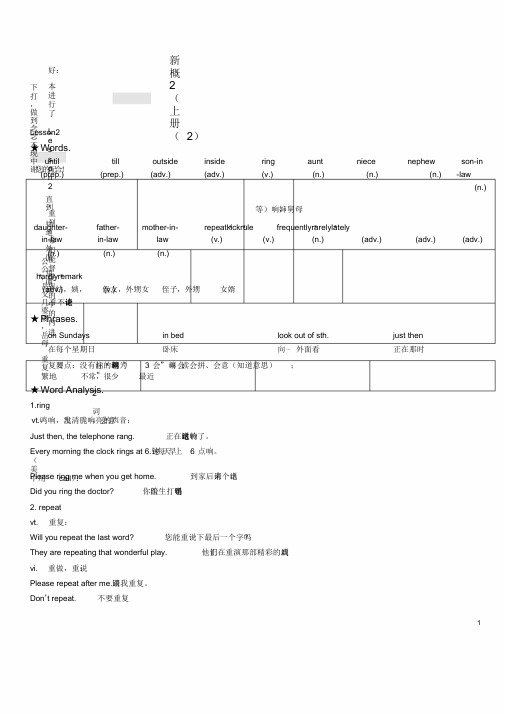
新概2(上册( 2)好:本进行了 L e ss o n 2 ,重列。
希们能督促您的中的内进 下打,做到念念不现中谢您的配合! Lesson2 ★Words. until till outside inside ring aunt niece nephewson-in (prep.) (prep.) (adv.) (adv.) (v.) (n.) (n.) (n.)-law(n.)直到 知道 外面 里面话 姑,姨, 侄女,外甥女 侄子,外甥 女婿 等)响婶,舅母 daughter- father- mother-in- repeat ﹡k ick ﹡r ule frequently ﹡r arely ﹡l ately in-law in-law law (v.) (v.) (n.) (adv.) (adv.) (adv.)(n.) (n.) (n.) 公公,岳父 婆婆,岳母重复繁地 不常,很少 最近 ﹡h ardly ﹡r emark (adv.) (v.) 几乎不评论,谈 ★Phrases. on Sundays in bed look out of sth. just then 在每个星期日卧床 向⋯ 外面看 正在那时复习要点:没有标注﹡的单词和组为“ 3 会”单词:会读、会拼、会意(知道意思) ; “2词,会意。
★Word Analysis. 1.ringvt.鸣,响,发出清脆响亮的声音: Just then, the telephone rang.正在这时,电话铃响了。
Every morning the clock rings at 6.这钟每天早上 6 点响。
(美中用 call ): Please ring me when you get home. 到家后请来个电话。
Did you ring the doctor? 你给医生打电话了吗? 2. repeat vt.重复:Will you repeat the last word?您能重说一下最后一个字吗?They are repeating that wonderful play. 他们正在重演那部精彩的戏剧。
新概念英语第二册-L2

Breakfast + lunch
Midnight snack
9:00
Tea
Supper
4:00
6:00
Afternoon tea
(because it was usually taken in the late afternoon) It is also called "low tea" because it was usually taken in a sitting room or withdrawing room where low tables (like a coffee table) were placed near sofas or chairs generally in a large withdrawing room.
aunt
n. sister of one’s father or mother; wife of one’s uncle
Auntiewer
Why was the writer’s aunt surprised? •Because he is still having breakfast and it’s already one o’clock.
• • • • • • • • •
4) 表不明身份的人或物。 e.g. Who’s that at the door? It is me. It is a lovely baby. 5) 作形式主语,代替不定式或主语从句等。 e.g. It is difficult to learn swimming. It is a pity that he can’t come tomorrow. 6)形式宾语,代替不定式或宾语从句等。 e.g. I think it a pity that you didn’t catch the train. • He thought it easy to get the tickets.
新概念英语第二册课堂笔记Lesson2
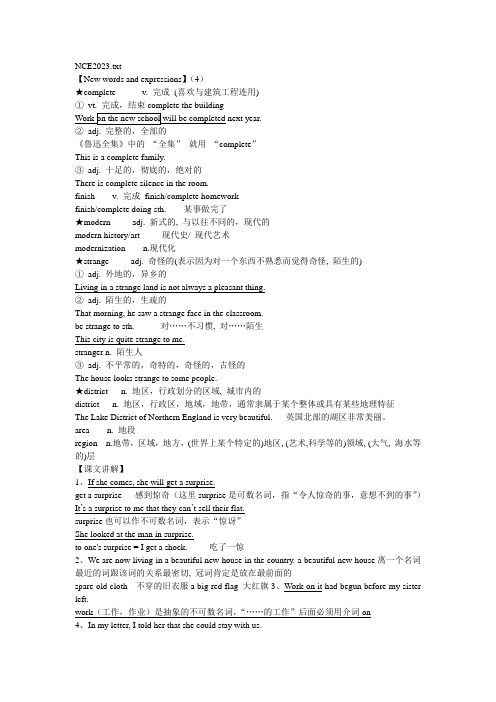
NCE2023.txt【New words and expressions】(4)★complete v. 完成(喜欢与建筑工程连用)①vt. 完成,结束complete the building②adj. 完整的,全部的《鲁迅全集》中的“全集”就用“complete”This is a complete family.③adj. 十足的,彻底的,绝对的There is complete silence in the room.finish v. 完成finish/complete homeworkfinish/complete doing sth. 某事做完了★modern adj. 新式的, 与以往不同的,现代的modern history/art 现代史/ 现代艺术modernization n.现代化★strange adj. 奇怪的(表示因为对一个东西不熟悉而觉得奇怪, 陌生的)①adj. 外地的,异乡的Living in a strange land is not always a pleasant thing.②adj. 陌生的,生疏的That morning, he saw a strange face in the classroom.be strange to sth. 对……不习惯, 对……陌生This city is quite strange to me.stranger n. 陌生人③adj. 不平常的,奇特的,奇怪的,古怪的The house looks strange to some people.★district n. 地区,行政划分的区域, 城市内的district n. 地区,行政区,地域,地带,通常隶属于某个整体或具有某些地理特征The Lake District of Northern England is very beautiful. 英国北部的湖区非常美丽。
新概念第二册 L2

It’s
raining outside
.
It’s bright and
warm inside .
ring
rang
rung
• The telephone rang. • My mother gave me a ring . • My mother rang me up. • My mother phone me . • The ring of the cellphone sounds
• 3.______sunny day! Let’s go out for a walk.
• A: How a B. How C. What a D. What • 【答案】 C • 【解析】:感叹句中的主语是单数,故what+
a+ adj. +名词单数。
Writing practice
Just then, the telephone rang. It was my aunt Lucy. Lucy said she had just arrived by train and she was coming to see him. He said he was still having breakfast. She asked what he was doing. He repeated he was having breakfast. She felt surprised. She asked if he always got up so late. It was one o’clock.
• 2. 【2011四川绵阳】7. This girl is ready to help people any time. When she is on the bus, she always _______ her seat to someone in need.
新概念二册讲义L2

NCE Lesson 2 Breakfast or lunch?.A. waitedB. didn't wait A. leave B. leftC. didn't leave指时间、天气、温度或距离,it被称为“虚主语”(empty subject)。
作为第三人称单数的中性代词,it可以指一件东西、一件事件或用来指是什么人:never 从来不(可以直接用在动词前面)=助动词+not (变成否定句,前面一定要加助动词)bed前不需加冠词:It’s time for bed now.by car 乘小汽车by land 由陆路by plane 乘飞机by sea 由海路by ship 乘船by train 乘火车同样用法的动词有:go,come,leave,arrive,land,meet,die,start,return,join…Dear me!或My dear! 美国人说: My god!现在进行时和一般现在时现在进行时表示说话的当时正在发生或正在发生的事件,也用来表示现阶段(一段时间)的动向。
现在进行时常与now,just,still等副词连用:I am working as a teacher. "现阶段"He is still sleeping. (现在还在睡觉)Jane is just dressing up. 简正在打扮。
一般现在时表示习惯性动作, 真理, 是过去、现在和未来都会发生的事情。
一般现在时一般与频率副词often,always,sometimes,never,frequently,rarely,ever等连用。
He went to school hungry.饿着肚子上学.You must come here hungry.空腹来这里.谓语采用正常语序。
What 对名词感叹,感叹句的结构为:What +a/an (+adj.)+n.(+主语+谓语)!What a good girl (she is)! (主、谓可省)有上下文和一定的语境, 才能省略形容词。
- 1、下载文档前请自行甄别文档内容的完整性,平台不提供额外的编辑、内容补充、找答案等附加服务。
- 2、"仅部分预览"的文档,不可在线预览部分如存在完整性等问题,可反馈申请退款(可完整预览的文档不适用该条件!)。
- 3、如文档侵犯您的权益,请联系客服反馈,我们会尽快为您处理(人工客服工作时间:9:00-18:30)。
新概念二册L2重点
1.until 直到
until 后面加时间状语(从句),前面加主句。
辨析:1.until在肯定句中:直到……为止
•I was a student until I left my college.
2.until否定句not…until中:直到…才
•She didn’t sleep until eight.
2.感叹句
1.what引导的感叹句
What + a/an+ 形容词+ 名词单数+ 主语+ 谓语(系)!
What a beautiful girl she is!
What +形容词+ 名词复数+ 主语+ 谓语(系)
what beautiful flowers they are!
What +形容词+ 不可数名词+ 主语+ 谓语(系)!
What clear water it is!
2.how引导的感叹句
How+形容词/副词+主+谓(系)!
How beautiful she is!
3.感叹句中what和how如何选择?
1)先找a/an,就用what
2)找adj,如果adj直接+n.,就用what
3)找到adv. 就用how
4.现在进行时:主语+be+doing
1.正在发生的动作He is sleeping.
2. 现在进行时表将来:表示按计划安排要发生的事件
常用动词:come,go,arrive,land,leave, die…
The bus is coming!车要来了!
The old man is dying. 那位老人已经奄奄一息了。
5.频率副词
always>usually>often>sometimes>seldom>never
对频率提问要用How often.
How often do you swim?。
